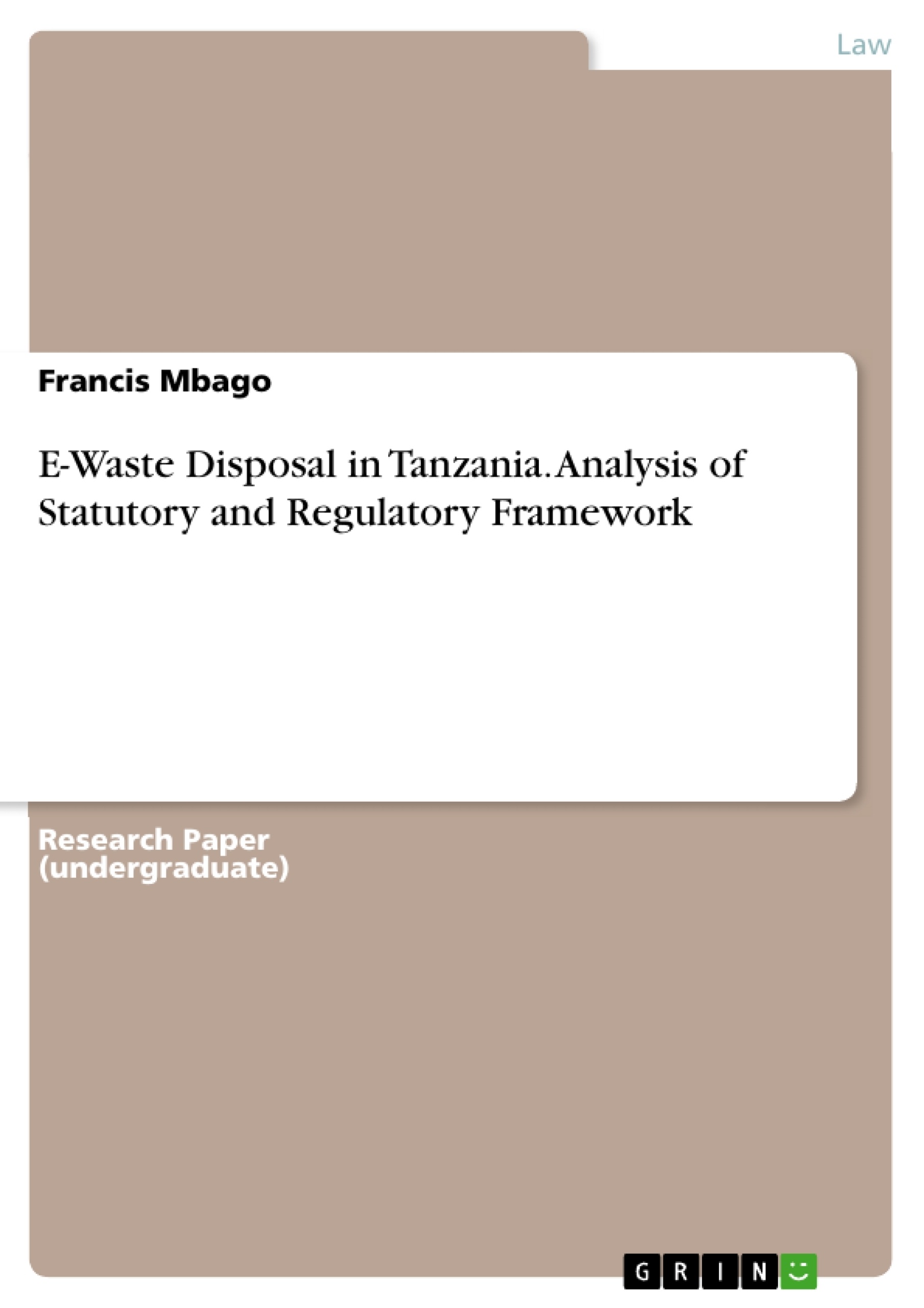Electronic waste (e-waste) is a term used loosely to refer to obsolete, broken, unusable or irreparable electronic devices like televisions, CPUs, computer monitors (flat screen and cathode ray tubes, laptops, printers, scanners, and associated wiring The definition of e-waste is extended to include other second hand e-products which are being exported from their countries of original to other developed countries. E-waste management is a global concern and it becomes a priority as the world experiences tremendous technological innovations, countries are being forced to develop and adopt new models for the collection and environmentally sound disposal of this waste. In Tanzania there is no specific legislation with regards to the management of e-waste disposal; its legal setting through EMA covers the issue of e-waste disposal in a general context. It clusters e-waste together with other solid waste. The Act doesn’t have any specific provisions on e-waste. The Act under Part IX considers e-waste in general context as hazardous waste thus making its regulation and management ineffective. This research tests the hypothesis on whether there is a legal lacuna with respect to statutory and regulatory framework dealing with e-waste disposal in Tanzania, whether statutory and regulatory framework in Tanzania, with regards to e-waste disposal is sufficient and effective in protecting, preventing and controlling e-waste disposal in Tanzania and whether the establishment of specific e-waste policy and enactment of specific legislation regarding e-waste disposal in Tanzania would amount to equitable solution over e-waste management. The main objective of the study is to identify legal lacuna that exist on the management e-waste disposal in Tanzania, to make an analysis of the statutory and regulatory framework with regards to e-waste disposal and to recommend establishment of effective legislation with regards to e-waste management in Tanzania. In realizing the objective; the research and made extensive analysis of legal framework on management of e-waste disposal; and various findings are discussed in connection with the interviews and questionnaire and in the final end the research recommends establishment of e-policy, regulatory authority and enactment of specific policy to cover for the management of e-waste disposal.
Inhaltsverzeichnis (Table of Contents)
- Introduction
- Conceptual Framework
- Definition of E-Waste
- Causes of E-Waste
- Impacts of E-Waste
- International Legal and Regulatory Framework on E-Waste Management
- E-Waste Management in Tanzania: An Overview
- Tanzania’s Legal and Regulatory Framework on E-Waste Management
- Challenges Facing E-Waste Management in Tanzania
- Recommendations
- Conclusion
Zielsetzung und Themenschwerpunkte (Objectives and Key Themes)
This research report delves into the complexities of e-waste disposal in Tanzania, focusing on a thorough analysis of the existing statutory and regulatory framework. The objective is to identify the key legal provisions governing e-waste management and assess their effectiveness in addressing the growing challenges associated with e-waste. The research explores potential solutions and recommends improvements to the legal framework to ensure responsible and sustainable e-waste disposal practices.
- E-Waste Management Framework in Tanzania
- Legal Challenges to Effective E-Waste Management
- International Best Practices and their Applicability to Tanzania
- Recommendations for Strengthening E-Waste Regulations
- Sustainable and Responsible E-Waste Disposal
Zusammenfassung der Kapitel (Chapter Summaries)
- Introduction: This chapter sets the stage for the research, outlining the problem of e-waste disposal in Tanzania and the growing need for a comprehensive legal framework. It highlights the increasing volume of electronic waste, its environmental and health impacts, and the urgency of addressing this issue.
- Conceptual Framework: This chapter provides a foundational understanding of e-waste. It defines e-waste, explores its various causes, and examines its adverse impacts on the environment and human health. It also delves into the international legal and regulatory framework governing e-waste management, highlighting key international conventions and principles.
- E-Waste Management in Tanzania: An Overview: This chapter focuses on the specific context of e-waste management in Tanzania. It analyzes the current legal and regulatory framework, identifying existing legislation and policies relevant to e-waste. The chapter then delves into the challenges encountered in effectively managing e-waste in Tanzania, including issues related to enforcement, public awareness, and infrastructure.
- Challenges Facing E-Waste Management in Tanzania: This chapter examines the specific challenges hindering effective e-waste management in Tanzania. It explores the inadequacy of existing regulations, the lack of public awareness and engagement, inadequate infrastructure for collection and disposal, and the prevalence of informal e-waste recycling practices.
- Recommendations: This chapter provides a set of recommendations for improving the e-waste management framework in Tanzania. It proposes legislative reforms to strengthen existing regulations, enhance enforcement mechanisms, promote public awareness, and encourage the adoption of sustainable e-waste management practices. It also suggests strategies for fostering collaboration between government agencies, private sector actors, and civil society organizations in promoting responsible e-waste disposal.
Schlüsselwörter (Keywords)
The core focus of this research is e-waste management, encompassing both the legal and regulatory framework governing its disposal in Tanzania. Key terms and concepts include e-waste, electronic waste, e-waste management, legal framework, regulatory framework, environmental protection, public health, sustainable development, Extended Producer Responsibility (EPR), international best practices, and challenges to e-waste management in developing countries.
- Arbeit zitieren
- Francis Mbago (Autor:in), 2018, E-Waste Disposal in Tanzania. Analysis of Statutory and Regulatory Framework, München, GRIN Verlag, https://www.grin.com/document/439297



